Tempting Customers With Comfort And Affordable Luxury With Silk Importer Daisy King
One Chinese Woman's Passion to Bring the Feel-Good Factor of Silk to Japan
Daisy King has only one mission: to introduce her customers to life as smooth as silk.
Daisy King is one of the many foreigners who came to Japan for a year, only to find her raison d’être, leading her to still be here a decade later. Three and a half years ago, she set up her business, Daisy King: Love Silk More, a brand of silk items for the bedroom and bathroom.
 © Photo by DaisyKing
© Photo by DaisyKing
Born in Suzhou, China’s center of silk production for the past 5,000 years, and the daughter of one of the city’s oldest silk manufacturing families, King has long been an evangelist of the benefits of silk. But it was a chance interaction in Tokyo that inspired her to leave a budding career in fashion to chase her dream of bringing Suzhou’s greatest export to Japan.
King has been undaunted by the challenges she has faced, including raising awareness of silk, establishing a client base and continuing to roll out new products, largely by herself. What started as a small adventure has now turned into a successful brand with a solid lineup that stretches from silk futon, pillowcases, silk room wear, underwear and more.
Savvy Tokyo met her to uncover her entrepreneurial journey in Tokyo.
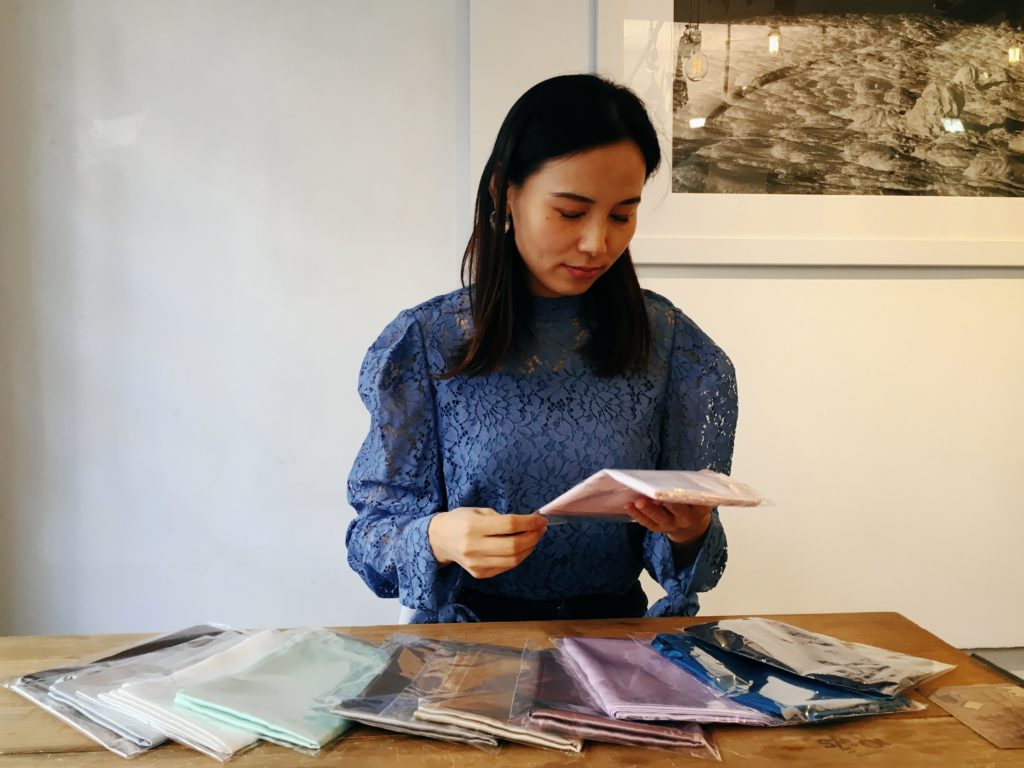
What brought you to Japan?
I was working for a Japanese company in Shanghai. I liked Japanese fashion and Tokyo seemed so romantic because I watched Japanese dramas on TV. I wanted to learn about fashion and a new culture so, when I was offered the chance to work in the company’s Tokyo office, I took it.
What did your role involve?
I was in charge of arranging cloth manufacturing in China. Once or twice a week, I went to the airport to collect the products and take them to clients. It was a hard job. At first, I couldn’t speak Japanese and China was always late in sending the products, so I had to take a lot of responsibility to meet clients’ deadlines. After one and a half years, I lost my job due to the global economic crisis.
‘I realized that people in Japan don’t know that silk is so good for a good night sleep!’
What did you do then?
My parents wanted me to go back to China, but I got a job offer from a bag company. I promised myself that if I went out and saw five people with the brand in one day, I would take the job. If I didn’t, I would go back to China. I went to a takoyaki place where three people waiting in line had the brand’s bag, so I took the job. I worked there for four years as a merchandiser in charge of quality and data control, managing the lines and colors needed in shops.
Why did you start your business?
My Japanese friend has a son with an allergy, so she asked me about Chinese medicines. I didn’t know anything about that, but I told her about my family’s silk manufacturing business and how a silk futon might help him. She bought one and said it was amazing, so she bought 50 more, for her family, friends and vacation homes.
I realized that I should be selling silk items in Japan, do something connected to my family because I am an only child. At that time I was 31, so I thought I should start as soon as possible.
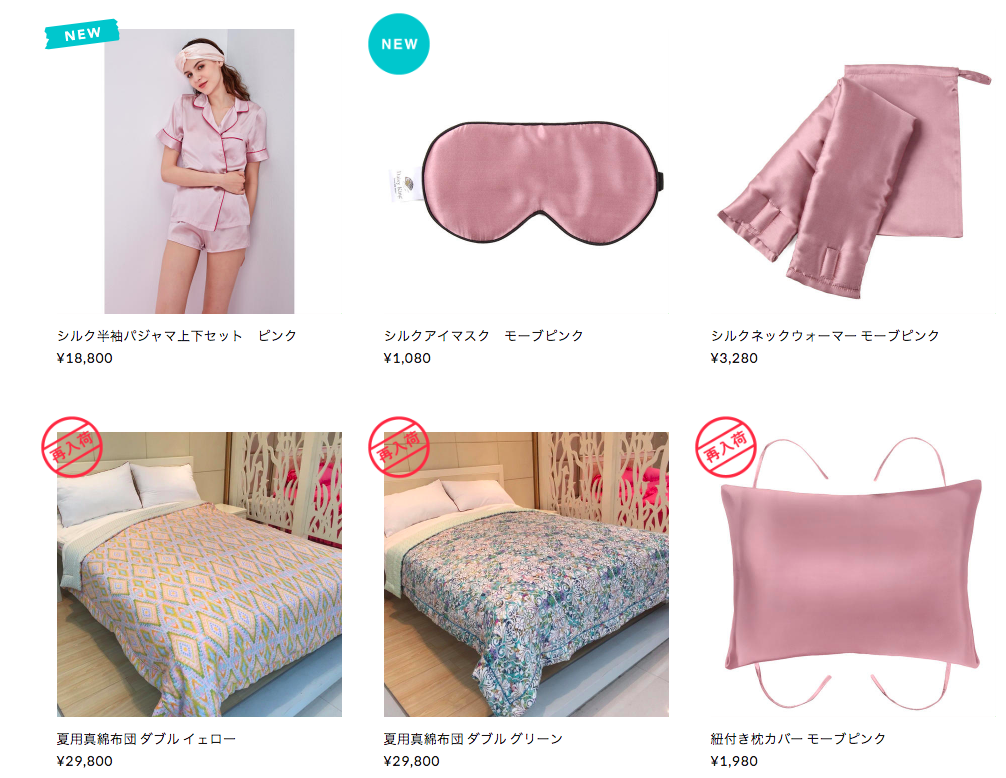
What’s special about silk?
It’s good for the skin and hair. With silk, there is three times less chafing on skin than with cotton and its special fibers reduce sweat build-up and prevent mites, making it clean. Also, silk has no static electricity.
Which product did you sell first?
I used a silk futon all my life except when I arrived in Japan. I looked in Tokyo but found only one, for ¥300,000. I realized that people in Japan don’t know that silk is so good for a good night sleep! In our family, a silk futon is a dowry as it is our fortune, so I started by selling silk futon. It was difficult, though, as people don’t buy futon frequently and I had no brand recognition.
I then started to sell eye masks and pillowcases because people could touch them easily and were, therefore, more likely to buy them. Some customers moved from buying these items to buying winter futon and then summer futon.
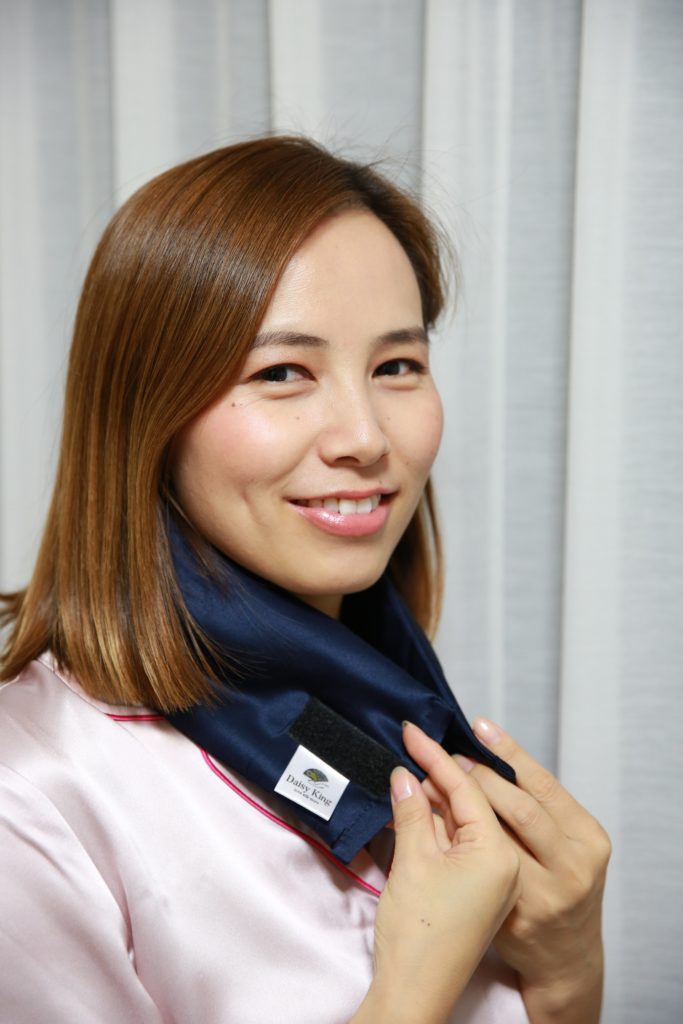
Daisy posing with a neck warmer, one of her brand’s popular products.
What challenges have you faced in the business and how have you overcome them?
Japanese people don’t trust “Made in China.” They always ask, “Is it 100% silk?” I tell them that 90% of the world’s silk is made in China. We are very proud of our silk products because not a lot of people can make them.
I had to make people believe in me and my products’ quality. I told them that all my products are made in my hometown—which is famous for silk—and most are from my family business, which is generations old. We have fields of mulberry leaves, which we feed the silkworms. Now we use machines, but we once made silk by hand. My father works in the silk museum in our town to show the equipment my family once used.
How have you built up the business?
Through my website – about 85% of my sales are online across Japan, with the rest through partnerships with small shops in Jiyugaoka and Yutenji. When I test new products, I ask my friends for their opinions. If I can’t speak with confidence about a product, I can’t convince others to like it. For example, people were worried about washing my pillowcases, so I put one in the washing machine 10 times, so I could say with confidence that it would be OK.
I had to make people believe in me and my products’ quality.
How does understanding Japanese culture help you with your business?
It helps a lot. For example, in China, people like bright, vivid colors and prints, but in Japan people like white, pink and low-key, elegant items.
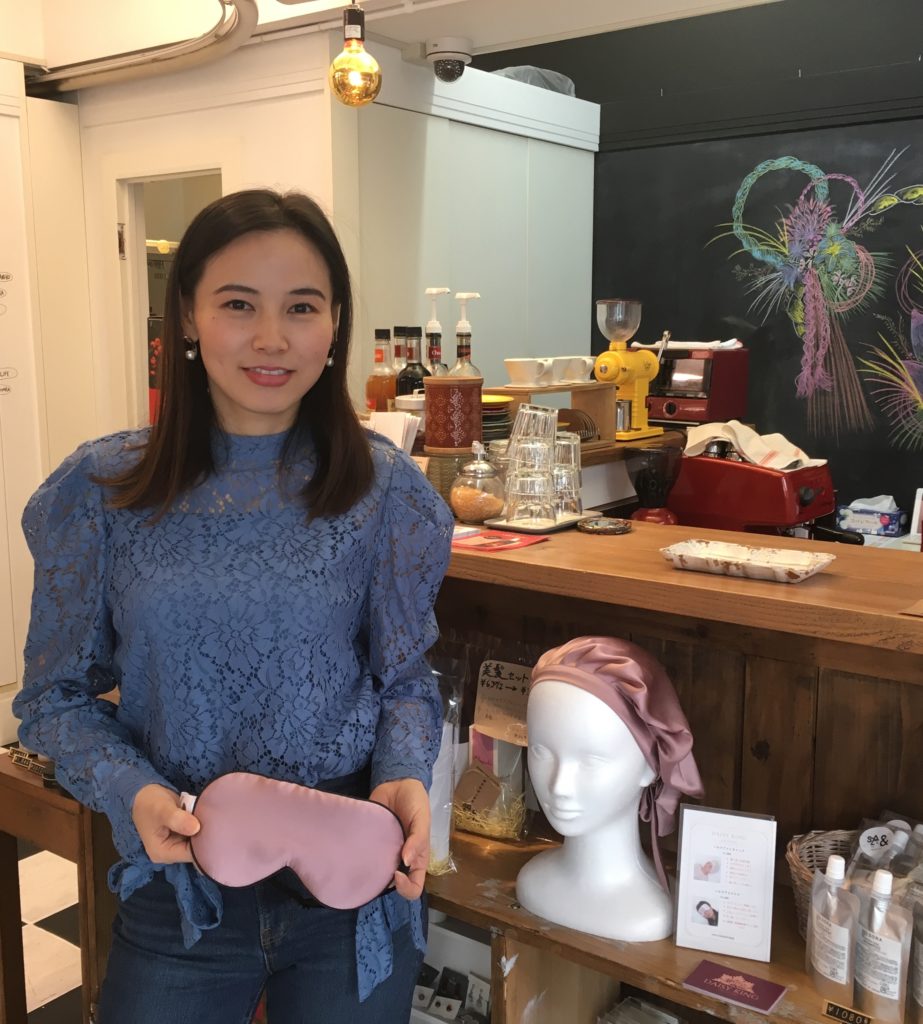
Daisy shows one of her brand’s products, a silk eye mask, at her office in Tokyo.
Have you found it difficult being a female entrepreneur?
No, I think you can be an entrepreneur regardless of gender or age. It’s about the effort you put in and your personality.
How does it feel to be supporting your family business?
It’s great. Without their support, I would never have made it. I love to make things — the art of craftsmanship is in my DNA. My whole family is involved in the fabric industry, from linen, polyester and silk manufacture to dyeing and making clothes. They are making things, but I want to make a brand, to provide people with consistent quality stuff.
How do you manage your workload?
Time is quite tight every day. Every morning, I take five minutes to write a list of priorities and do the urgent tasks first.
But, after three years, the business has got easier because I made a system. I know in which seasons I have to make orders, and in which seasons I will get busy and ask someone to help me.
How do you balance your work and personal life?
When you have your own business you don’t feel tired, even if you are working on Saturday or Sunday, so I work on some weekends, but I also enjoy my free time. I go out with my friends and go running twice a week. These days I’m running in Roppongi and Marunouchi. I also do yoga once a week — I’m a big yoga fan. And I enjoy traveling.
For more information on DaisyKing’s products, check the brand’s official website here.
Savvy Spotlight is a monthly feature introducing foreign and Japanese women at the frontline of what’s successful, contributing, cool, unique and interesting in the city. If you have anyone in mind you would like us to interview, leave us a comment below with your recommendations!












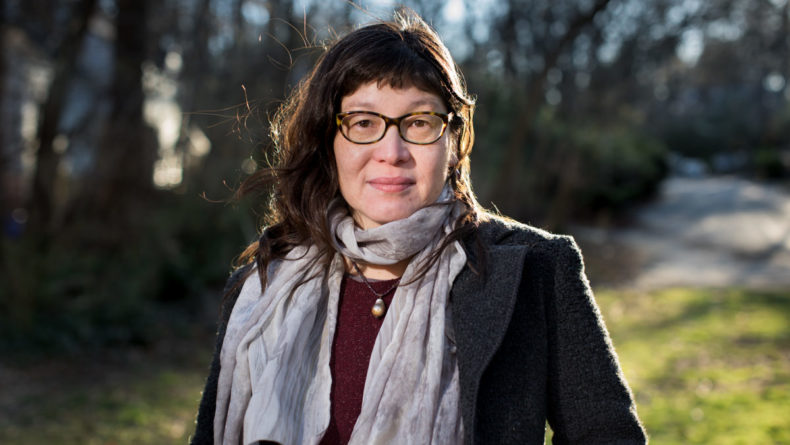
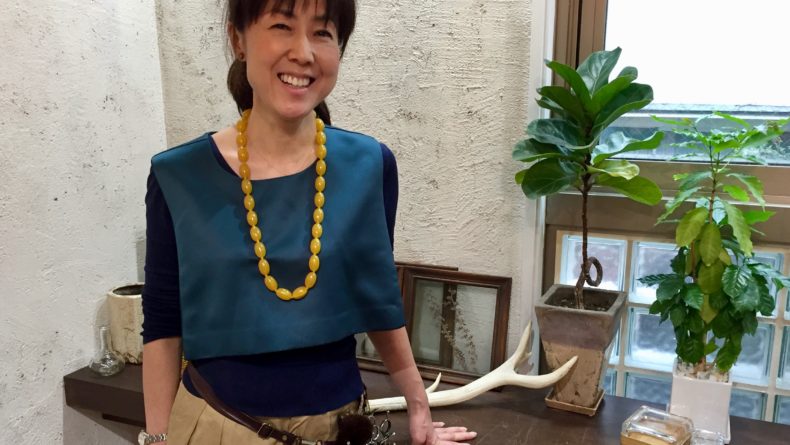
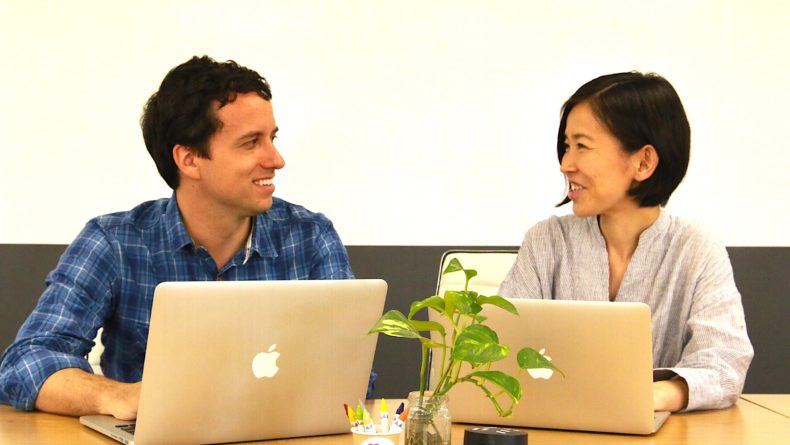
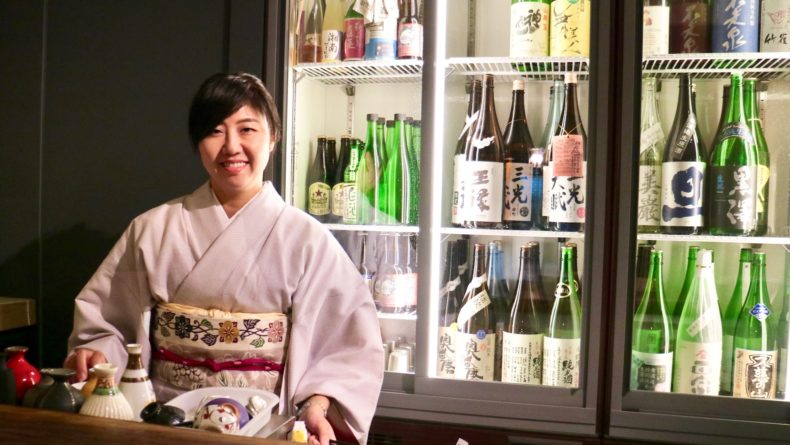
Leave a Reply